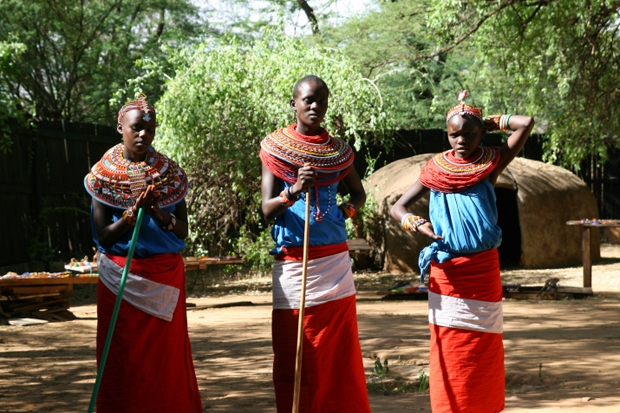Laikipia
‘Good morning, sir!’ The warrior strides up to me on the high plains and shakes my hand. ‘May I traverse your farm? I thought it impolite not to ask.’ I am astonished at his excellent English accent. This is a youth in full Samburu kit: red ochre paint, a snood from which pokes a long feather, bunting and Christmas tinsel, a toga, Man U stockings and thousand-miler tyre sandals. He carries a long-shafted spear tipped with an ostrich pompom, a stabbing sword, a knobkerrie ending in a wing nut nicked from a lorry and a finbo — a long thin wand. He tells me his name is Douglas. He’s been all the way through school and has ambitions to be a police officer or a pilot. It’s a delightful conversation and as he strides off I wish him well. Douglas is a rarity among his warrior age set, the Lopwaketi. Each age set, which spans roughly seven years, earns a name that supposedly sets the tone for their actions. Previous age sets were the Talkers, the Blunderers, the Starers and the Surprised Ones. Lopwaketi means ‘Beloved Groundbreakers’, though I have found them to be relentlessly traditional in their rustling of my cattle. Last year they shot up my boma and stole seven cows. Our hot trod pursuit of the tracks turned cold. Later I heard that the thieves had seared out my ranch brand on the cattle hides. Maidens rubbed them with ochre and butter and sang to them. I came to learn the names of the youths who stole my cows and where my animals are, but until now the authorities have not helped me to retrieve them and redeeming them would require a thunder run into a stockade bristling with rifles. The other day those young bloods were back, this time not to rustle but instead to graze their livestock on my pasture.
Disagree with half of it, enjoy reading all of it
TRY 3 MONTHS FOR $5
Our magazine articles are for subscribers only. Start your 3-month trial today for just $5 and subscribe to more than one view
Already a subscriber? Log in







Comments
Join the debate for just £1 a month
Be part of the conversation with other Spectator readers by getting your first three months for £3.
UNLOCK ACCESS Just £1 a monthAlready a subscriber? Log in